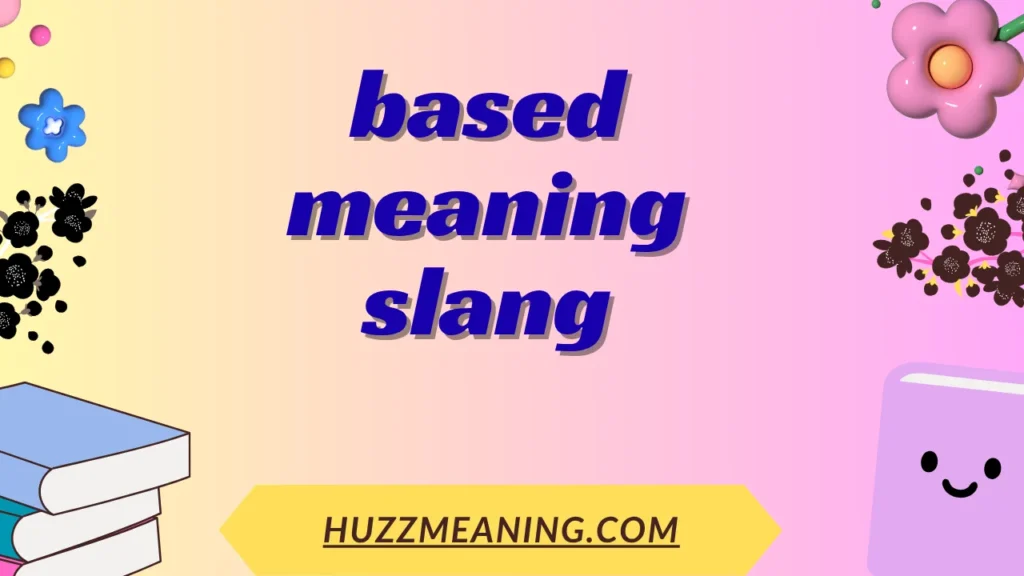Language keeps evolving, and slang moves even faster. Every few years, new words pop up that completely redefine how people express confidence, individuality, and authenticity. One of those words is “based.”
If you’ve ever scrolled through social media and seen someone comment, “That’s so based,” you might’ve wondered what it actually means. Is it good? Is it bad? Why do people use it so much? 🤔
Let’s dive deep into the meaning of “based” in slang, where it came from, how it’s used, and why it has become such a powerful word in online culture and everyday conversation.
What Does “Based” Mean in Slang?
In modern slang, “based” means being unapologetically yourself — expressing your true opinions confidently without caring about what others think.
It’s often used to praise someone for being bold, honest, or authentic. When someone says “You’re so based,” it usually means “You’re right,” “You’re confident,” or “You’re not afraid to speak the truth.”
👉 In short: Being based = Being true to yourself, even if others disagree.
The Origin of “Based”
The term “based” has an interesting backstory that dates back to early hip-hop culture and Internet communities.
Originally, the word “based” wasn’t positive at all. It came from “basehead,” a derogatory term used in the 1980s for people addicted to freebasing cocaine. However, rapper Lil B (The Based God) flipped the meaning completely in the 2000s.
He redefined “based” to mean “being yourself and not caring what others think.”
“Being based is being yourself. Not being scared of what people think of you.” — Lil B (The Based God)
From that point on, “based” became a symbol of freedom, positivity, and self-expression.
The Evolution of “Based” in Internet Culture
After Lil B popularized it, “based” spread across online spaces like Reddit, 4chan, Twitter (X), and TikTok.
It evolved from a niche internet term to a mainstream expression. People started using “based” as a way to:
- Approve of someone’s bold opinion
- Agree with a controversial take
- Admire someone’s authenticity
- Celebrate confidence or individuality
Over time, “based” became a badge of honor — a way of saying, “You’re not afraid to stand out.” 😎
Examples of “Based” in Conversation
Here are a few real-life examples of how people use “based” in slang:
| Situation | Example Sentence | Meaning |
|---|---|---|
| Someone tells an unpopular truth | “He said what everyone was thinking. That’s so based.” | Praising honesty |
| A friend expresses confidence | “You don’t care what others say — that’s based energy.” | Admiring authenticity |
| Commenting on a viral post | “Finally someone said it! Based.” | Expressing agreement |
| A bold opinion on social media | “Pineapple belongs on pizza. Fight me.” — “Based.” | Respecting boldness |
Based vs. Cringe 😬
Online slang often works in opposites. If someone is “based,” they’re admired for confidence and authenticity.
If someone is “cringe,” they’re awkward, fake, or trying too hard to impress others.
Example:
- Saying what you believe in without fear = Based
- Pretending to fit in for approval = Cringe
This contrast explains why “based” has become such a powerful word — it’s not just about confidence; it’s about realness.
The Deeper Meaning: Authenticity in the Digital Age
Being “based” resonates deeply with today’s generation because social media often promotes filters, trends, and performance.
When someone acts “based,” they’re rejecting fake personas and choosing authentic self-expression. That’s why the term is both rebellious and empowering.
✨ To be based is to be real in a world full of copies.
How “Based” Differs Across Contexts
“Based” can mean slightly different things depending on where and how it’s used:
| Platform | Typical Use | Example |
|---|---|---|
| Twitter (X) | Agreeing with political or cultural opinions | “That take is 100% based.” |
| TikTok | Praising confidence or humor | “She’s so based for that joke 😂” |
| Gaming communities | Respecting skill or leadership | “Bro carried the whole team — based gamer.” |
| Everyday speech | Complimenting individuality | “You don’t follow trends? That’s based.” |
Why “Based” Became So Popular
Several reasons explain the rise of “based” in recent years:
- Cultural shift toward authenticity – People value realness over perfection.
- Influence of influencers and creators – Many creators embrace “based” to describe fearless opinions.
- Memetic culture – The word became viral due to memes and ironic usage.
- Rebellion against cancel culture – “Based” became a way to support freedom of speech and independent thought.
It’s not just slang — it’s a cultural mindset.
Variations and Related Slang
“Based” often appears with other slang expressions that reinforce its tone:
- “Based AF” – Extremely based
- “Stay based” – Keep being true to yourself
- “Based moment” – A time when someone says or does something confidently
- “Unbased” – The opposite of based (weak or fake opinion)
These variations make the term more expressive and versatile in digital communication.
Psychological Appeal of Being “Based”
Humans naturally crave authenticity and self-expression. Using or identifying with “based” satisfies that need.
It reflects a person’s desire to:
- Be respected for honesty
- Feel empowered by individuality
- Connect with others who value truth
That’s why “based” has transcended from slang into a symbol of self-confidence.
“Based” in Pop Culture and Media
From rap lyrics to TikTok captions, “based” appears everywhere. It has moved beyond Lil B’s legacy and is now a part of everyday online speech.
Celebrities, influencers, and even brands sometimes use “based” humorously to connect with younger audiences.
For example:
- A fashion brand posting a bold design might caption: “Too loud? Maybe. But it’s based.”
- A YouTuber saying something unpopular might joke: “I’ll take the hate — that’s based.”
This widespread use keeps the word fresh, flexible, and relevant.
Is “Based” Always Positive?
Most of the time, yes — but context matters.
Sometimes, “based” can be used ironically or sarcastically, especially online.
For example:
- “You skipped work again? Wow, based.” (sarcasm)
So, tone and situation play a big role in how it’s received.
How to Use “Based” Correctly 😎
If you want to sound natural using “based,” here are a few quick tips:
✅ Use it to praise confidence or truth.
✅ Keep it short — “based” often stands alone.
✅ Avoid overusing it; too much sounds forced.
✅ Understand the context (humorous vs. serious).
Examples:
- “She spoke her mind — based.”
- “That playlist? Totally based.”
- “Not caring what others think = based mindset.”
Linguistic Insight: Why “Based” Sticks
From a linguistic perspective, “based” works because it’s short, punchy, and emotionally charged.
It creates an instant connection — a one-word approval that feels powerful.
Unlike longer phrases, “based” delivers meaning quickly and memorably.
That’s why it thrives in online communication, memes, and pop culture dialogues.
FAQs About “Based” Meaning in Slang
Q1. What does “based” mean in text or online?
It means being true to yourself and confident in your beliefs, even if they’re unpopular.
Q2. Who started the term “based”?
The rapper Lil B (The Based God) popularized it in the early 2000s, redefining it from negative to positive.
Q3. Is being “based” a compliment?
Yes! It’s a modern compliment that praises someone for honesty, courage, or authenticity.
Q4. What’s the opposite of “based”?
The opposite is “cringe” or “unbased” — being fake, weak, or conformist.
Q5. Can “based” be used professionally?
In casual or creative industries, yes. But it’s mostly informal slang, so avoid it in formal writing.
Conclusion (Final Thoughts)
The slang term “based” has come a long way — from a misunderstood street term to a cultural expression of individuality and confidence.
It represents authenticity, courage, and freedom of thought in a world obsessed with trends and approval.
So next time someone calls you “based,” take it as a badge of honor. 😎🔥
Because being “based” means one thing above all —
✨ You’re real, you’re fearless, and you’re unapologetically you.


